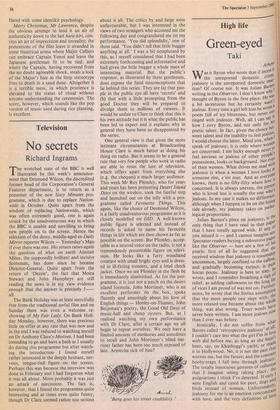Television
No secrets
Richard Ingrams
rir he wretched state of the BBC is well
.1 illustrated by this week's announce- ment that Desmond Wilcox, the discredited former head of the Corporation's General Features department, is to return as a presenter of the new Sixty Minutes pro- gramme, which is due to replace Nation- wide in October. Quite apart from the wisdom of replacing Nationwide, which was often extremely good, one is again struck by the unadventurous way in which the BBC is unable and unwilling to bring new people on to the screen. Hence the selection of the dusty, middle-aged ex-Daily Mirror reporter Wilcox — Yesterday's Man if ever there was one. His return raises again the question of what on earth Alastair Milne, the supposedly brilliant and incisive Scotsman, has done since he became Director-General. Quite apart from the return of `Dezzie', the fact that Moira Stewart and John Humphrys are still reading the news is in my view evidence enough that the answer is precisely f
all.
The Bank Holiday was at least mercifully free fromuhe traditional awful film and on Sunday there was even a welcome re- showing of My Fair Lady. On Bank Holi- day Monday, however, there was precious little on offer at any rate that was new and in the end I was reduced to watching myself on Dr Anthony Clare's Motives. I had been intending to go and have a bath as I usually do during this programme but after watch- ing the introduction I found myself rather interested in the deeply hesitant, ner- vous, tongue-tied figure on the screen. Perhaps this was because the interview was done in February and I had forgotten what it was all about. More probably it was just an attack of narcissism. The fact is, however, that I found the programme quite interesting and at times even quite funny, though Dr Clare seemed rather too serious about it all. The critics by and large were unfavourable, but I was interested in the views of two strangers who accosted me the following day and congratulated me on my performance. 'You did splendidly,' one of them said. 'You didn't tell that little bugger anything at all.' I was a bit nonplussed by this, as I myself considered that I had been extremely forthcoming and informative and had given the little bugger a whole mass of interesting material. But the public's response, as illustrated by these gentlemen, does expose the fatal misconceptions that lie behind this series. They are (a) that peo- ple in the public eye all have 'secrets' and (b) that with a little prompting from the good Doctor they will be prepared to divulge them to millions of viewers. It would be unfair to Clare to think that this is his own attitude but it is what the public has been led to expect and it explains why in general they have been so disappointed by the series.
One general view is that given the more intimate circumstances at Broadcasting House Clare is much better at doing his thing on radio. But it seems to be a general rule that very few people who work in radio are able to resist the lure of television, which offers apart from everything else (e.g. the cheques) a much larger audience. This week Mr Roy Plomley, who for years and years has been presenting Desert Island Discs on the wireless, took the fateful step and launched out on the telly with a pro- gramme called Favourite Things. This again, like the choice of Desmond Wilcox, is a fairly unadventurous programme as it is closely modelled on DID. A well-known public figure is selected and instead of records is asked to name his favourite things in life which are then shown as far as possible on the screen. But Plomley, accep- table as a neutral voice on the radio, is not a tremendously presentable figure on televi- sion. He looks like a furry woodland creature with small bright eyes and is dress- ed in ill-fitting trousers, and a loud check jacket. Once we see Plomley in the flesh he is immediately diminished. As for the pro- gramme, it is just not a patch on the desert island formula. John Mortimer, who is an excellent performer on the box, spoke fluently and amusingly about his love of English things — Henley-on-Thames, John Betjeman's poetry, the Good Old Days of music-hall and cheap oysters. But, as 1 realised watching my own performance with Dr Clare, after a certain age we all begin to repeat ourselves. We only have a limited amount of memories and anecdotes to recall and John Mortimer's blind bar- rister father has been too much exposed of late. Arentcha sick of him?
'Bang goes his street credibility.'


































 Previous page
Previous page